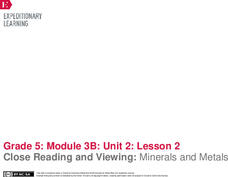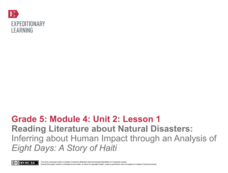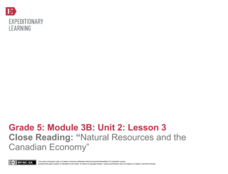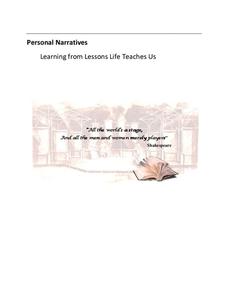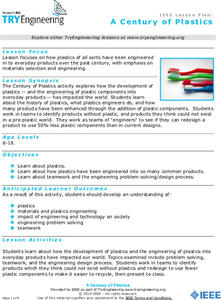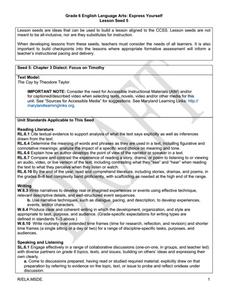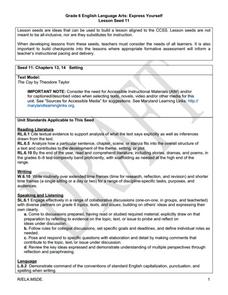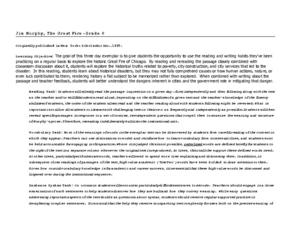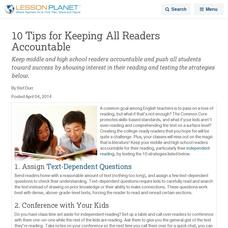EngageNY
Close Reading and Viewing: Minerals and Metals
How easy is it to live off the land? Scholars read Minerals and Metals in Your Life and discuss how Canada's natural resources meet the needs of the people. Pupils watch a brief video and discuss the gist of the text and video. They then...
EngageNY
Reading Literature about Natural Disasters: Inferring about Human Impact through an Analysis of Eight Days: A Story of Haiti
This is a disaster. Scholars look through the book Eight Days: A Story of Haiti and discuss their wonderings about the text and natural disasters. They then complete a first read to determine gist and second read to answer text-dependent...
Tennessee State Museum
An Emancipation Proclamation Map Lesson
Did the Emancipation Proclamation free all slaves during the Civil War? Why was it written, and what were its immediate and long-term effects? After reading primary source materials, constructing political maps representing information...
Southern Nevada Regional Professional Development Program
“Tell Me a Story”: Moving from Reading to Writing
Narrative essay writing is the focus of a series of exercises that model for learners how to not only read a narrative, but how to also examine the techniques fiction writers use to create a setting, develop their characters, represent...
Southern Nevada Regional Professional Development Program
Reading Literature - The Ruin
Cross-comparison, the technique of focusing on two different texts with the same themes, motifs, events, etc., is employed in an exercise that asks groups to examine two different translations of “The Ruin,” a poem, written in Old...
EngageNY
Resource Materials and Gathering Information: Reading Another “Choice” Text from the Research Folder
Look it up. Scholars use a dictionary and thesaurus to verify the meaning of the research vocabulary words they defined in the previous activity. They then use sticky notes to write a synonym for each word. Finally, individuals choose a...
EngageNY
Close Reading: “Natural Resources and the Canadian Economy”
Readers continue to learn how natural resources are important to Canada's economy. They read, annotate, and answer text-dependent questions about Natural Resources and the Canadian Economy. They then discuss key terms in the text.
Thoughtful Education Press
Personal Narratives: Learning from Lessons Life Teaches Us
"First Appearance," Mark Twain's tale about overcoming stage fright, serves as a model of a personal narrative and gets young writers thinking about milestones in their own lives. After examining student models and considering the...
Curated OER
A Season for Chapters
Art, music, poetry, and the beauty of the seasons is what you'll find in this very nice unit idea. You can use any of the suggested books and activities to engage your second graders in an exploration of the changes that take place...
Institute of Electrical and Electronics Engineers
A Century of Plastics
After reading about polymer materials, engineer trainees examine how plastics have been integrated into everyday products. In groups, they compile a list of products made entirely without plastics and then, as a closing activity, try to...
Curated OER
Express Yourself Lesson Seed 5
Building on the previous activity in this series of lesson seeds, this plan focuses on the use of dialect in Theodore Taylor's novel, The Cay. Class members examine specific lines of text, use their reading journals to respond to the...
Curated OER
Express Yourself Lesson Seed 11: Setting
Encourage your learners to examine the setting in Theodore Taylor's The Cay. Pupils work in small groups to put together a description of the setting before reading two more chapters of the book. They use their double-entry journals to...
Maryland Department of Education
The Concept of Diversity in World Literature Lesson 9: Debating Imperialism
To gain an understanding of Imperialism, class members read Rudyard Kipling's poem, "The White Man's Burden" and Mark Twain's essay, "To the Person Sitting in Darkness." Groups compare these perceptions of non-white cultures with the...
Maryland Department of Education
The Concept of Diversity in World Literature Lesson 4: Proverbs
"Eneke the bird says since men have learnt to shoot without missing, he has learnt to fly without perching." As part of their study of Things Fall Apart, class members read Paul Hernadi and Francis Steen's essay, "The Tropical Landscapes...
EngageNY
Grade 10 ELA Module 1: Unit 3, Lesson 5
Even the most rigid expectations come from a place of deeply held values. In a key chapter of Amy Tan's The Joy Luck Club, explore the ways that Jing-Mei's mother's parental expectations affect her relationship with Jing-Mei. Tenth...
Channel Islands Film
Once Upon a Time (Saxipak’a): Lesson Plan 4
How did the environment and natural resources found on the Channel islands influence the culture of the Chumash? Archaeology meets technology in an activity designed for middle schoolers. After viewing West of The West's documentary Once...
Curated OER
Jim Murphy, The Great Fire - Grade 6
The Great Fire by Jim Murphy provides the text for a study of the Chicago fire of 1871. The plan is designed as a close reading activity so that all learners have the same background information require for writing. Richly detailed, the...
Curated OER
The Tell-Tale Hearts of Writers
Knock, knock, knock...Creep out your class with a critical thinking lesson focused on word relationships in Edgar Allen Poe's "The Tell-Tale Heart." They investigate the relationship between word choice, mood, and interpretation of a...
Santa Ana Unified School District
The Giver
Wouldn't it be great to live an a community without pain, without danger? Such a society is the goal of the community in The Giver. Using Lois Lowry's dystopian novel as the core text, class members read primary source materials about...
Curated OER
Modern Minstrelsy: Exploring Racist Stereotypes in Literature and Life
Satires may be designed to expose a bias to ridicule but if misunderstood can they reinforce that bias? Langston Hughes poem, “Minstrel Man” opens a discussion of racist stereotypes, the minstrel tradition, and the musical, “The...
Curated OER
Playing With Science
Young scientists investigate the scientific concepts and principles that help make common toys such as hula hoops, yo-yos, slinkies, and silly putty work. As a class, they read "Backyard Rocket Science, Served Wet" to get a look behind...
Curated OER
Family Life
What is family? Challenge your scholars to write an encompassing definition of what this word means to them. After reading "It May Be a Family Matter, But Just Try to Define Family," class members discuss the emotional issues surrounding...
Curated OER
10 Tips for Keeping All Readers Accountable
Keep middle and high school readers accountable and push all students toward success by showing interest in their reading and testing the strategies below.
Curated OER
Comparing SLaves and Servants in Colonial New York
Young historians compare and contrast differences in the laws that regulated the activities of slaves and servants. They review and analyze a series of primary source documents to explain the social constructs related to slaves and...


